|
****JavaScript based drop down DHTML menu generated by NavStudio. (OpenCube Inc. - http://www.opencube.com)****

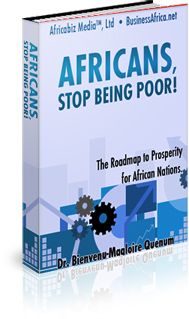
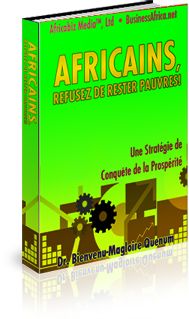
|
| ! |
| AFRICABIZ
VOL 1 - ISSUE: 47
MARCH
15 - APRIL 14, 2003
Previous
Issue
Editor: Dr. Bienvenu-Magloire
Quenum
Click here for contact & support console
| | A
WORD FROM THE EDITOR
| | |
|
Dear visitor and international investor,
We
warmly welcome you, if this is
your first visit to Africabiz
Online - The ultimate newsletter
on trading and investing in 49
sub-Saharan African countries.
If you are a regular and faithful
reader, welcome back.
If you are a regular and faithful reader, welcome
back
.
With this delivery starts a new series of business opportunities related to
Flowers And Fragrance Plants' agribusiness. The main products extracted from
these plants and flowers are called Essential Oils. The establishment of
Essential Oils industry is a sure gateway to pharmaceuticals industry for any
African country; in perfect line with supplements and nutriceucals industry previously
introduced to you. You may scroll down now to the Business
Opportunities section for more.
-
IS IT THE END OF THE NIGHTMARE IN IVORY COAST?
After nearly six months of a stupid
civil war, Ivory Coast's political leaders agreed on the setup of a Reconcilement
government. On March 7, 2003, at Accra, Ghana,
they signed an addendum to the Marcoussis Agreement - The Accra
Agreement. And on March 10, 2003, the designated Prime Minister, under Marcoussis
Agreement, Mr. Seydou Diarra, took office from Mr. Affi N'Guessan, the acting
Prime Minister of Gbagbo's previous government.
The new Reconcilement
government held its first meeting on March 13, 2003 at Yamoussoukro, the Administrative
capital city. Half of the ministries - from MPCI
and RDR - did not attend. Some of their designated ministries being contested
by Gbagbo in contradiction to a provision
of the Marcoussis Agreement. That showdown may jeopardize the new cabinet,
as MPCI made it clear that it will not back down.
Anyway the Reconcilement
government, which comprises antagonistic forces of former rebels and Ouattara's
RDR on one side; and Gbagbo's FPI, Bedie's PDCI-RDA and five other political parties
on the other side, will have to work to reestablish a) The unity of the nation;
b) The confidence between Northerners and Southerners; c) And restore the disrupted
economy as established for in the program
set forth by the Marcoussis Agreement.
It will not be an easy task. Indeed,
six months of civil war deeply changed the political stage of Ivory Coast. New
young political leaders have emerged, who are more uncompromising in comparison
to the old guard of politicians. And the economy is devastated. For sure the Reconcilement
government will ride bumpy political road for two and a half year till the next
presidential ballot scheduled for October 2005.
We are certainly going
to witness frequent and harsh political convulsions. The Identification process
and procedure [Who is Ivorian and who is not Ivorian?], security matters and the
listing of the constituency for the presidential ballot will create tensions amongst
the Reconcilement government's members and their respective political parties.
Let's hope that these inevitable political fights will not degenerate
into another bloodshed.
Concerning the economy,
the Reconcilement government has ahead an uphill task to turn it around.
Indeed, hundred of small scale businesses, in services, manufacturing and agriculture
- patiently set up over three decades - are now either severely disrupted or simply
bankrupted. Sugar cane and cotton agribusiness, located in the Northern part of
the country, suffered production dislocation and export disturbances. Cocoa and
coffee agribusiness are also in big trouble. The quality of cocoa beans, for instance,
dropped, from international standard and producers are selling year 2003's harvest
to purchasers from Guinea,
Mali and Burkina
bypassing the local market. Thousand of workers and employees are out of job.
The transportation business, by road or railways, between the North and the South,
is severely disrupted and damaged. Etc.
In brief, within a short time
period of 6 months of civil war, the damage to the economy is immense and Ivory
Coast shall experience negative economic growth rate for at least two to three
years running. Conservative forecast for Year 2003 is -3,5%. Down from -2.5% in
2002. Performance hardly enough of triggering the development of a sustainable
economy capable of alleviating poverty as here
extensively exposed.
Furthermore, neighboring landlocked countries, Mali
and Burkina Faso have been obliged
to hastily reroute their imports and exports activities. Decision makers of said
countries will certainly not totally reverse to the former route to the port of
Abidjan, Ivory Coast.
And therefore Abidjan's harbor, the first in the Region in haulage and containers
dispatching activities for two decades running, will have to face an increasing
harsh competition from Dakar/ Senegal,
Tema/ Ghana, Cotonou/ Benin
and Lome/ Togo and even so
far as Douala/ Cameroon.
-
GOOD STRATEGIC DECISIONS AND ORGANIZATION, PLANNING, HARD WORK AND EFFICIENT MANAGEMENT
ARE KEYS TO ECONOMIC SUCCESS
The 31st edition of the America
Cup had been brilliantly won by Team Alinghi / Le Defi Suisse originating
from a landlocked country, Switzerland. The Defi Suisse won against seasoned sailing
teams from the United States of America, Australia, Italy, France, New Zealand.
Etc. Good strategic decisions making, impeccable crew staffing, and efficient
race planning put Alinghi team in the winning seat. African countries could learn
a lot from that success in their fight for economic development. Click
here for more;
-
Contributor's Guidelines are here
for review. Your contribution on "How African countries / entrepreneurs
could bridge the developing gap" is welcome.
Many thanks for dropping by and see you here on April 15,
2003
Dr. B.M. Quenum
Editor
of AFRICABIZ

| | | |
BUSINESS
OPPORTUNITIES IN AFRICA
| |
-
Several business opportunities with high profit making potential, which are economic
catalysts and components to the Strategy for African Countries - here
available, have been introduced to you. They are listed in following table.
| a-
SHEA BUTTER (Issues 5, 6,
7, 11,
12, 13)
b- BLUE GOLD (Issues 14,
15, 16,
17, 18,
19)
c- FREEZE-DRIED
PAPAIN (Issues 20, 21,
22 and here)
d- KENAF (Issues 23,
24)
e- VEGETABLE OIL
(Issues 25, 26,
27 and 28)
f- CEREALS (Issues 30,
31, 32,
33)
g- FRUITS
(34, 35,
36, 37,
38, 39,
40, 42,
43, 44,
45, 46)
| -
TROPICAL FLOWERS AND FRAGRANCE PLANTS AGRIBUSINESS AS INCOME
BUILDING POWER FOR AN AFRICAN COMMUNITY: PART
- I - INTRODUCTION TO THE ESSENTIAL OILS' INDUSTRY AND TRADE
Essential
oils are odorous products obtained from natural raw materials such as leaves,
fruits, roots and wood of many seasonal or perennial plants. They are generally
of complex composition and contain alcohol, aldehydes, ketones, phenols, esters,
ethers, and turpenes in varying proportions. An estimated 3,000 essential oils
are known of which approximately 300 are of commercial importance. The majority
of them are obtained from agricultural plants, but some 28 essential oils are
collected in commercial quantities from wild sources Below is a short list of
essential oils and the plants they originated from; together with the main producing
countries (Adapted from this link).
List
of Some Wild Or Cultivated Plants Suitable For The Production Of Essential Oils
| Products
| Botanical
source | Main
origin | | Amyris
| Amyris
balsamifera | Haiti
| | Anise/star
anise | Pimpinella
anisum | Spain,
Soviet Union, Poland | | Anise,
star | Anisum
verum | China,
Vietnam | | Bay/laurel
leaf | Pimenta
racemosa/Laurus nobilis | Dominica,
Turkey, Italy, Cote d'Ivoire
| | Cabreuva
| Myrocarpus
frondosus | Brazil
| | Caraway
seed | Carum
carvi | Many
Asian, Western Europe and North African Countries, USA |
| Cedarwood
| Cedrus
spp./Juniperus spp. | India,
Sri Lanka, Guatemala, USA, China, Kenya
| | Cinnamon/Cassia
| Cinnamomum
verum/C. cassia | Sri
Lanka (Cinnamon), China (Cassia) |
| Citronella
/ Sweet Calamus | Cymbopogon
spp. | Indonesia,
China, Sri Lanka, India, USA, Taiwan, Guatemala, Malawi
| | Davana
| Artemisia
spp. | India,
Pakistan | | Eucalyptus
| Eucalyptus
globulus | China,
USA, Portugal, Spain, South
Africa, Brazil, Australia, Malawi
| | Geranium | Pelargonium
graveolens | Morocco,
Algeria, Egypt, Reunion, China, Kenya,
Tanzania, East European
Countries, Russia | | Lavender
| Lavendula
spp. | France,
Italy, Spain, Hungary. | | Lemon
grass | Cymbopogon
citratus | India,
Guatemala, China | | Litsea
| Litsea
cubeba | China
| | Muhuhu
| Brachyleana
hutchinsii | Tanzania
| | Nutmeg/mace
| Myristica
fragrans | Indonesia,
Grenada, Sri Lanka | | Palmarosa
| Cymbopogon
martini | India
| | Patchouli
| Pogostemon
cablin | Indonesia,
China | | Pimento
(Allspice) | Pimenta
dioica | Jamaica,
USA | | Rosewood
| Aniba
rosaeodora | Brazil,
Peru | | Sandalwood
| Santalum
album | India,
Indonesia | | Sassafras
| Ocotea
pretiosa | Brazil
| | Tagetes
| Tagetes
glandulifera | East
and Southern Africa | | Thyme
| Thymus
vulgaris | Spain
| | Vetiver
| Vetiveria
zizanioides | Haiti,
Indonesia, China, Reunion |
| Ylang-ylang
| Cananga
odorata | Comoros,
Madagascar, Indonesia
| -
Flowers and fragrance plants'
industry is a sector with tremendous opportunities for African countries to have
a share of the big pie of the
international trade of essential oils. The reforestation policy - necessary
in some if not all of African countries to control recurrent drought - should
be undertaken by planting trees species, which could be used as raw material for
the production of aromatic oils. The most promising speculations are essential
oils from : Geranium, Citronella, Lemon grass or Sweet calamus, Eucalyptus.
- THE INTERNATIONAL MARKET
Little
information is available for free on the size of the market for essential oils
and plant extracts. The most detailed statistics are provided by the US Department
of Commerce's Census Bureau. Other free sources such as the European Union' statistics
are global and do not list the several categories of essentials oils exported
or imported by European Union's countries members states. [Click
here if you are prepared to shed US$ 1,360 to get a full printed report on
The West European Market For Essential Oils - For Digital Deliveries In Adobe
PDF For Several Regional Markets Click
here]
Table 1 below gives an idea of the level of transactions worldwide
in the markets for essential oils. It shows an average increase per year (between
1986-1998) of +10.9 for Exports and 10.7 for Imports.
| TABLE
1 - World Trade In Essential Oils, Perfumes And Flavors - US$
million | | | 1986 | 1990 | 1994 | 1998 | 2002
Est. | 1986-98
Average % pa | | Exports | 2
149 | 4
122 | 5
051 | 7
435 | 8
254 | +10.9 |
| Imports | 2
008 | 4
206 | 6
811 | 4
802 | 5
316 | +10.7 |
| Source:
United Nations International Trade Yearbook 1999 and 2002 |
World
total production of essential oils is estimated at about 100,000 to 110,000 metric
tons. [Source].
The major exporters of essential oils are the United States (US), the European
Union (EU) and a number of developing countries, the most important of which are
China, Indonesia, India and Brazil. In year 1998 the EU accounted for 52 per cent
of the value of world exports, and the US for 13 per cent (UN's Yearbook1999).
Developed countries are the main importers of essential oils, with the EU and
the US accounting for 44 per cent and 8 per cent respectively in 1998 (UN's Yearbook
1999). Other big consumers are Japan, East European countries and China. For
more Click here for Adobe
PDF digital deliveries on several regional markets.
In Table 2 below
are reported the import value in US $ of essentials oils by the United States
of America.
| TABLE
2 - Imports of Essential Oils by USA - US$ x 1000 |
| Imports | 1997 | 1998 | 1999 | 2000 | 2001 | 2001 | 2002 | %CHNG |
| World
Total |
359,526 |
369,853 |
338,807 |
334,497 |
329,898 |
329,898 |
363,134 |
10.07 |
| Africa
Total |
2,919 |
1,912 |
2,577 |
3,622 |
8,342 |
8,342 |
6,268 |
-24.86 | Data
Source: Department of Commerce, US Census Bureau, Foreign Trade Statistics
The categories of essential oils imported from Africa by USA are reported in Table
3 below. One can see that Eucalyptus, Geranium, Citronella and Lemon Grass
essential oils, which are the most used essential oils in quantities - are not
explicitly mentioned. Are they included in the category labeled Other Commodities?
We can not tell as we do not have access to more detailed statistics.
| TABLE
3 - US's Essential Oils Imports From Africa x 1000 US$ |
| Imports | 1998 | 1999 | 2000 | 2001 | 2002 |
| Lemon
Oil | 317 | 465 | 1,069 | 2,475 | 2,238 |
| Ess
Oil x Citrus | 566 | 662 | 1,056 | 2,448 | 1,741 |
| Grapefruit
Oil | 130 | 414 | 405 | 1,634 | 1,146 |
| Orange
Oil | 0 | 29 | 50 | 109 | 495 |
| Paprika
Olesreen | 6 | 101 | 165 | 840 | 210 |
| Citrus,
Nes Oil | 169 | 202 | 71 | 81 | 142 |
| Clove
Oil | 399 | 277 | 179 | 242 | 136 |
| Alc
Mix<20%<50% | 4 | 2 | 0 | 21 | 94 |
| Ess
Oil Temp Nes | 0 | 10 | 27 | 15 | 39 |
| Other
Commodities | 321 | 413 | 601 | 478 | 28 |
| TOTAL | 1,912 | 2,577 | 3,622 | 8,342 | 6,268 |
Data
Source: Department of Commerce, US Census Bureau, Foreign Trade Statistics
-
THE INTERNATIONAL TRADE OF THE FOUR MOST USED ESSENTIAL
OILS (For
more accurate and current international selling prices of the categories below
briefly outlined, you may need to purchase Adobe PDF digital deliveries available
here)
1
- Geranium
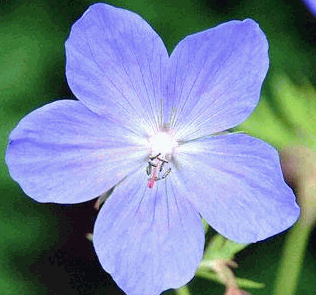 -
Geranium essential oil is one of the most marketed and its components, citronellol
and geraniol, are used for the synthesis and manufacturing of a great number
of high grade and superior quality perfumes. Taking into account all brands and
origins, the world production of geranium essential oil total up to around
400 metric tons per year with a monetary value in the range of 20 - 30 millions
US dollars. R�union - an island in the Indian Ocean; French territory -
produces the best quality geranium essential oil in the world. Its production
level is around 50 - 60 metric tons per year. Second in quality are the North
African countries productions; Morocco and Algeria together account for 10 to
20 tons; Egypt for around 70 tons. China provides for 100 - 150 tons yearly
of a less good quality geranium essential oil comparatively to the other origins
above mentioned. Kenya and
Tanzania were exporters
some time ago; they are no longer on the market. -
Geranium essential oil is one of the most marketed and its components, citronellol
and geraniol, are used for the synthesis and manufacturing of a great number
of high grade and superior quality perfumes. Taking into account all brands and
origins, the world production of geranium essential oil total up to around
400 metric tons per year with a monetary value in the range of 20 - 30 millions
US dollars. R�union - an island in the Indian Ocean; French territory -
produces the best quality geranium essential oil in the world. Its production
level is around 50 - 60 metric tons per year. Second in quality are the North
African countries productions; Morocco and Algeria together account for 10 to
20 tons; Egypt for around 70 tons. China provides for 100 - 150 tons yearly
of a less good quality geranium essential oil comparatively to the other origins
above mentioned. Kenya and
Tanzania were exporters
some time ago; they are no longer on the market.
The geranium essential
oil produced by the East European countries - Russia included - is totally used
for their internal consumption.
The largest importers are the USA (around
65 metric tons per year); France (95 tons); United Kingdom (20 tons); West Germany
(15 tons); Japan (20 tons). East European countries barter also great quantities.
R�union's superior quality geranium essential oil is sold around 90 US dollar
per kilo; Egyptian origin one 65 US dollar per kilo; Chinese brand 50 - 55 US
dollar per kilo. Prices fluctuate according to China's production level and sales
on the international market.
The decline of production in La R�union
and Egypt combined with the increasing level of the Chinese internal consumption
make it possible for a newcomer to enter the international market of geranium
essential oil.
2 - Eucalyptus
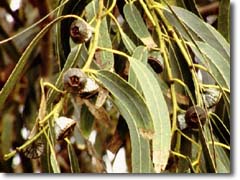 -
Only few of the 400 species of eucalyptus are used to produce eucalyptus essential
oil. Among those are Eucalyptus Globulus, E. Smithii and E. Australiana
which are used in the pharmaceutical industry. Eucalyptus Citriodora is used
in the fragrance industry as the main source for citronellal. The total world
production of all those categories is around 2,000 metric tons per year; but E.
Citriodora accounts for less than 200 tons. Portugal and Spain are the largest
producers (400 and 200 tons respectively); Brazil, Australia and South
Africa are also large producers. DRC
used to be on the market. France is the leading importing country (approximately
600 metric tons per year); followed by the USA (around 300 tons); West Germany
(230 tons) and the United Kingdom (150 tons). -
Only few of the 400 species of eucalyptus are used to produce eucalyptus essential
oil. Among those are Eucalyptus Globulus, E. Smithii and E. Australiana
which are used in the pharmaceutical industry. Eucalyptus Citriodora is used
in the fragrance industry as the main source for citronellal. The total world
production of all those categories is around 2,000 metric tons per year; but E.
Citriodora accounts for less than 200 tons. Portugal and Spain are the largest
producers (400 and 200 tons respectively); Brazil, Australia and South
Africa are also large producers. DRC
used to be on the market. France is the leading importing country (approximately
600 metric tons per year); followed by the USA (around 300 tons); West Germany
(230 tons) and the United Kingdom (150 tons).
The utilization of eucalyptus
essential oil by the pharmaceutical industry had increased steadily over the years,
particularly for its constituent cineol. The Citriodora has not followed the same
trend; but with the new tendency to use natural products instead of chemically
synthesized ones, the demand for E. Citriodora shall increase to produce citronellal.
Selling prices of eucalyptus essential oils increased slowly from US dollar
6 per kilo in 1980 to 8 by 1989; and as the production cost is rising in Spain,
Portugal and Australia, the prospects for new suppliers are good, particularly
if Cinnamomum Camphora is accepted as a source of cineol for medicinal uses.
3 - Citronella
Two kinds of citronella essential oils dominate the world market : the Cympobogon
Nardus from Sri Lanka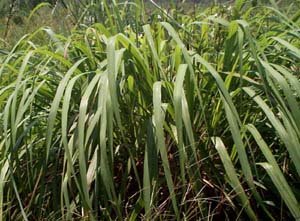 and the Cympobogon Winteranus from Java. The former is produced exclusively
in Sri Lanka. Both are profusely used in the fragrance's industry, particularly
for the manufacturing of soaps, detergents and household and cleaning products.
Two constituents of citronella essential oils : the Citronellal and the Geraniol
are also very used in the fragrance industry. Indonesia is the leading producer
and main exporters of citronella essential oil. But its exportations which reached
the peak in 1986 (850 tons) is declining as home consumption increased. China
exports quite the same quantity as Indonesia. Guatemala is on the market for 200
tons /year. Brazil and India are also important producers; but mainly only for
their home consumption.
and the Cympobogon Winteranus from Java. The former is produced exclusively
in Sri Lanka. Both are profusely used in the fragrance's industry, particularly
for the manufacturing of soaps, detergents and household and cleaning products.
Two constituents of citronella essential oils : the Citronellal and the Geraniol
are also very used in the fragrance industry. Indonesia is the leading producer
and main exporters of citronella essential oil. But its exportations which reached
the peak in 1986 (850 tons) is declining as home consumption increased. China
exports quite the same quantity as Indonesia. Guatemala is on the market for 200
tons /year. Brazil and India are also important producers; but mainly only for
their home consumption.
The main importers are Japan (around 180 tons
/year); USA (150 tons); France (140 tons); The Netherlands (140 tons); United
Kingdom and West Germany (100 tons each). Selling prices during the beginning
of the 80's were around 6 to 8 US dollars per kilo and hit 10 US dollars in 1987-88;
but the competition of synthesized citronella oil will has a moderation impact
on the price evolution.
4 - Lemon grass
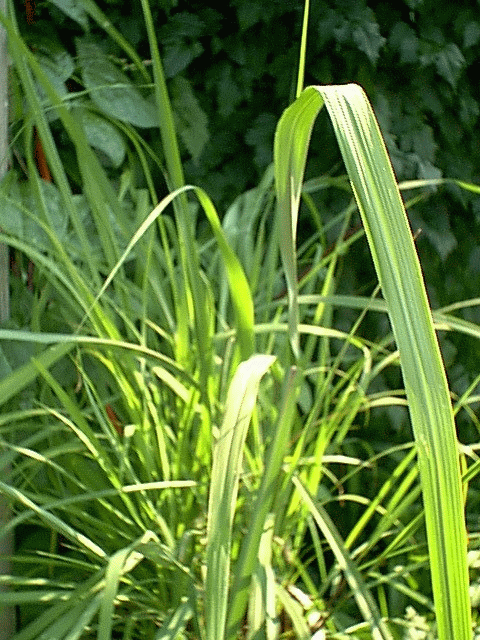 -
Two specimens of lemon grass essential oils dominate the market : the one produced
from the Cympobogon Flexnosus, a lemon grass originated from Eastern India,
and the other produced from the Cympobogon Citratus (Western India); but
the commercial distinction between the two kinds of lemon grass essential oil
is quickly fading. The lemon grass essential oils are directly used in a wide
range of low grade, inferior quality perfume and household products; they are
also the main source for citral which is one of the raw materials used to produce
ionones and vitamins A and E. -
Two specimens of lemon grass essential oils dominate the market : the one produced
from the Cympobogon Flexnosus, a lemon grass originated from Eastern India,
and the other produced from the Cympobogon Citratus (Western India); but
the commercial distinction between the two kinds of lemon grass essential oil
is quickly fading. The lemon grass essential oils are directly used in a wide
range of low grade, inferior quality perfume and household products; they are
also the main source for citral which is one of the raw materials used to produce
ionones and vitamins A and E.
The lemon grass essential oils
dominated the essential oils market over twenty years but suffered from the harsh
competition of synthesized essential oils and the Chinese essential oil made from
Litsea Cubeba (another raw material for citral).
There have been
a constant commercial disputes over lemon grass essential oil because of the uncertainty
created on the market by India which uses a great portion of its production (750
tons /year) for its home consumption and exports the remaining to former USSR
under barter agreement. Nowadays, the Republic of Guatemala is the leading exporter
(250 tons). China is on the market for 80 to 100 tons per year. USA and former
USSR import each around 70 tons per year; the United Kingdom 65 tons; France and
Japan 35 tons each; and West Germany around 20 tons.
Selling prices
fluctuate according to the quantity of lemon grass essential oils put on the international
market by India. India's brands are sold around US dollars 17 per kilo against
9 per kilo for Guatemala's brand.
Based on above briefs on the amount
of hard currency generated by the international trade of essential oils, one can
have an idea about what African countries could gain from entering the market.
They can undertake needed reforestation of their national territories by planting
trees that are suitable to the production of essential oils and therefore kill
two birds with one stone.
The production of essential oils will provide
to any African country, which takes the necessary economic and financial measures
to entering the market, first, local finished products / raw materials for the
establishment of national pharmaceuticals and perfumes industries; and second,
increase its reserve of foreign currency.
The production of essentials
oils is also a complement to the former delivery dedicated to nutriments and supplements
pharmaceutical ventures here
described as essential oils from Lemon grass provide the basic raw material
(citral) for the production of Vitamins A and E.
Adobe
Acrobat Reader is available here
In Issue 48, the chemical
properties and usages of essential oils will be addressed; prior to the methods
of preparation (49) and the
exposition of a small scale production facility 50
and a medium/ large scale operation (51).
- Interested parties - private African and international investors /
companies, government
agencies,
international development
agencies - to make contact through the Free Access Support Console available at this link
Contact through the support console will get quickest reply from Africabiz Online's staff, than contact by emails. Click here for contact information. Be advised that first contact should be through the support console to be followed by phone calls. If you are a VIP-Member, use VIP-Members Support Console available here.
Before you consult please click
here to review this clarification
| |

